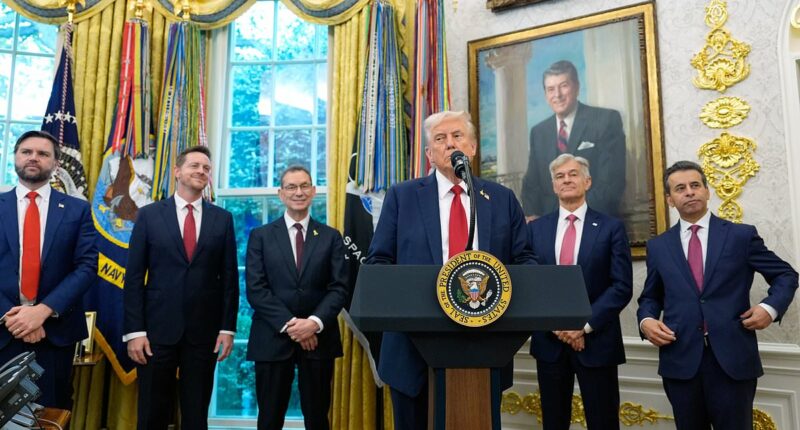Share this @internewscast.com
President Donald Trump and the pharmaceutical company Pfizer have declared an agreement to reduce the prices of several prescription medications ‘starting immediately.’
The administration announced in a Tuesday press conference that ‘virtually Pfizer’s entire portfolio of drugs’ will be available at reduced prices on TrumpRx, a ‘site soon to be launched.’
According to press secretary Karoline Leavitt on Tuesday, Americans will have the ability to purchase prescription drugs directly through the website, bypassing insurance.
Chris Klomp, senior advisor to the Department of Health and Human Services secretary Robert F Kennedy Jr, stated on Tuesday that this deal will result in the largest price reductions ‘in American history.’
The initiative will implement ‘most-favored-nation’ drug pricing, which seeks out the lowest available medication price in other developed countries and adopts that price. This follows Trump’s signing of an executive order in May pushing drug manufacturers to adopt MFN pricing.
Trump claimed that some drugs, which he did not name, would lower in price by ‘up to 1,000 percent.’
While it remains uncertain exactly when the pricing changes will begin, Trump asserted they will commence ‘starting immediately.’ It is also unclear whether these lower drug prices will be accessible to those on government insurance such as Medicare or Medicaid, or to those with private insurance.
The TrumpRx site is not yet up.

President Trump is pictured alongside, from left, Vice President JD Vance, HHS secretary senior advisor Chris Klomp, Pfizer CEO Albert Bourla, CMS administrator Dr Mehmet Oz and FDA commissioner Dr Marty Makary
The announcement also follows the administration’s plans to impose a 100 percent tariff on branded or patented pharmaceutical products manufactured outside of the US, raising the prices of drugs not made in the US.
Pfizer has also committed to investing $70billion to shift drug manufacturing to the US from overseas, as well as fund research and development.
FDA commissioner Dr Marty Makary said: ‘Today is the beginning of the end of the great American ripoff.
‘The growth of drug spending, that is the increase in drug pricing, is the fastest and biggest-increasing area of health care spending. So today’s announcement has incredible implications for health care spending in the United States.’
Klomp said: ‘This is a major win in the battle for affordable healthcare and affordable drugs.’
Albert Bourla, Pfizer CEO, said at the press conference that the deal will enable the company to provide a ‘greater’ focus to innovations like cancer treatments and new, effective vaccines.
He said: ‘This is a historic day. Today we are turning the tide and reversing an unfair situation.’
Trump also said he is going to unveil ‘next week’ an unspecified pill that could be lowered to just $10 for a prescription based on MFN pricing.
He also noted the administration ‘is making deals’ with other companies like Eli Lilly, and if the companies do not comply, they will be subject to tariffs around five to eight percent.
Trump said: ‘The world is going to go up a lot. But now it’s fair. We’re going to pay what the rest of the world is paying.’
Trump acknowledged that ‘there will probably be a shutdown’ of the government, but it’s unclear how a potential shutdown may alter the Trump Rx timeline.
The latest data shows the annual cost of prescription medications per person in the US was about $1,400 in 2022, including patient out-of-pocket spending, insurer coverage, and government programs.

Data from the Department of Health and Human Services (HHS) shows between January 2022 and January 2023, more than 4,200 prescription drugs increased in price, and nearly half were above the rate of inflation.
The average drug price increase over the course of the period was 15 percent, which translates to $590 per product. And the largest increase seen was 3,000 percent.
A 2024 JAMA study also found common drugs like Jardiance, which treat diabetes, are up to five times more expensive in the US that in nations like Australia.
The increases over the past several years have largely been blamed on a lack of restraints on drug prices in the US, along with drug companies offering financial incentives to doctors and hospitals.
Pfizer manufacturers and distributes 300 prescription drugs and vaccines, including the mRNA Covid vaccine long criticized by the Trump administration, erectile dysfunction pill Viagra and anxiety drug Xanax.
Its portfolio also includes 22 approved cancer medications to treat breast, prostate, kidney and lung cancer, among others.
| Drug | 2023 price | New price |
|---|---|---|
| Ozempic | $936 per month’s supply | $970 per month’s supply |
| Mounjaro | $1,023 per month’s supply | $1,070 per month’s supply |
| Dupixent | $3,584 per month’s supply | $3,800 per month’s supply |
| Biktarvy | $3,794 per month’s supply | $3,980 per month’s supply |
| Skyrizi | $20,000 a dose | $21,160 a dose |
| Wellbutrin | $2,113 per month’s supply | $2,322 per month’s supply |
| Shingrix | $185 per dose | $199 per dose |
| Eliquis | $560 per month’s supply | $594 per month’s supply |
| Trikafta | $25,067 for a 28-day supply | $26,546 for a 28-day supply |
| Xeljanz | $5,557 per month’s supply | $5,890 per month’s supply |
| Calquence | $16,192 per month’s supply | $16,678 per month’s supply |
| Fasenra | $5350 per month’s supply | $5,511 per month’s supply |
















